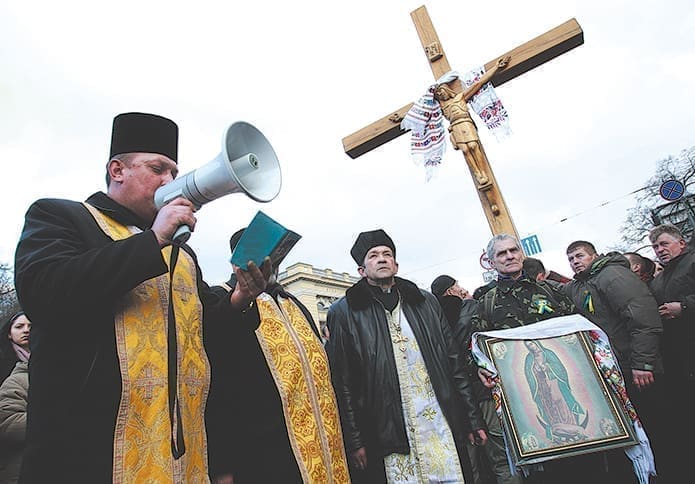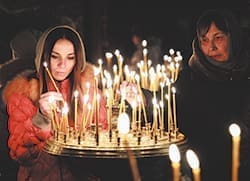 CNS photo/David Mdzinarishvili, Reuters
CNS photo/David Mdzinarishvili, ReutersEngland
Ukrainian churches urge peace as war clouds gather
By JONATHAN LUXMOORE, Catholic News Service | Published March 6, 2014
OXFORD, England (CNS)—Church leaders in Ukraine appealed for peace in their country’s Crimea peninsula as its government accused Russia of “carrying out an armed invasion.”
The pleas came soon after several hundred camouflage-wearing troops without insignia and armed with military-style rifles entered and secured areas of the civilian airport in Crimea’s regional capital of Simerfopol Feb. 27 and patrolled elsewhere in the autonomous region of Ukraine.
Ukrainian-Russian ties have been tense since the Feb. 21 ouster of President Viktor Yanukovych after three months of protests by opposition groups.
“Crimea’s motto, inscribed on its coat of arms, is ‘prosperity in unity.’ Let us not forget this in such difficult times,” said Auxiliary Bishop Jacek Pyl of Odessa-Simferopol, which includes Crimea.
“In solidarity with the legacy of our parents, who cared for the development of the Autonomous Republic of Crimea, I urge all believers and nonbelievers to refrain from extremism, and not to allow the fraternal bond between people living in Crimea to break.”
The bishop’s appeal was published by Ukraine’s Catholic Credo magazine as the Kiev government urged the United Nations Security Council to discuss the crisis.

Women light candles during prayer service at a church in Kiev, Ukraine, Feb. 23. Ukraine’s acting government issued a warrant Feb. 24 for the arrest of President Viktor Yanukovich, last reportedly seen in the pro-Russian Black Sea peninsula of Crimea, accusing him of mass crimes against protesters who stood up for months against his rule. CNS photo/David Mdzinarishvili, Reuters
He said he counted on local Catholics to pray and fast for peace, and to help remember all inhabitants, whatever their faith or ethnic origin, were “children of the one God.”
Bishop Pyl said he hoped “God will liberate our hearts from all evil intentions.”
“No one wants trouble here, but for now our future is unknown and in God’s hands,” he said, urging prayers for the Crimea.
“Orthodox, Muslims, Protestants, Catholics, Jews, Karaites, representatives of other faiths and nonbelievers have lived together peacefully here for centuries, and we must not allow our origins or religions to divide us today, or for blood to be shed as in Kiev,” Bishop Pyl said.
Meanwhile, a Catholic priest at the Black Sea naval port of Sevastopol said local people had been left “fearful and uncertain” by the military presence.
“We are praying for our homeland and the state authorities, and hoping there’ll be no bloodshed,” Father Jan Bielecki of St. Clement Pope and Martyr Parish told Catholic News Service Feb. 28.
As the Russian-speaking troops occupied Crimea’s regional parliament in Simferopol, ethnic Ukrainians loyal to Kiev pledged to block Russian occupation of the region, which was transferred from Russia to Ukraine in 1954.
Located on the northern coast of the Black Sea, the region was established as the Autonomous Republic of Crimea after Ukraine regained its independence in 1991.
Ukrainian Interior Minister Arsen Avakov said Russian soldiers had arrived at Sevastopol’s military airport near Russia’s Black Sea Fleet base Feb. 28 and accused Moscow of staging “an armed invasion and occupation in violation of all international agreements and norms.”
However, the fleet, which also has aircraft stationed at Gvardeyskaya and Kacha, denied Feb. 28 its soldiers were involved.
In a Feb. 26 statement, the All-Ukrainian Council of Churches and Religious Organizations “categorically condemned” talk of dividing the country as “a sin against God and future generations.”
“We urge the authorities to refrain from any steps that could be construed as dividing Ukrainians on religious, linguistic, national, regional or any other grounds,” said the council, which includes Ukraine’s Catholic and Orthodox churches.
However, Russia’s Foreign Ministry said Feb. 28 it was “seriously concerned” that Orthodox churches and Russian memorials were being “desecrated” in Ukraine, and minority rights violated “in violation of international obligations.”
Prayers for Ukraine were offered Feb. 28 at Catholic churches in neighboring Poland and Slovakia.
In a Feb. 26 interview with Italy’s Il Messaggero daily, Archbishop Sviatoslav Shevchuk of Kiev-Halych, head of the Ukrainian Catholic Church, said Russia’s offer of citizenship to Crimea’s inhabitants revealed a “known strategy,” which had also been followed in Russia’s 2008 invasion of Georgia.
“Of course, forces exist in this neighboring country which are inciting civil war in Ukraine,” Archbishop Shevchuk said.
“We now need human and diplomatic solidarity. Europe must wake up,” he said.